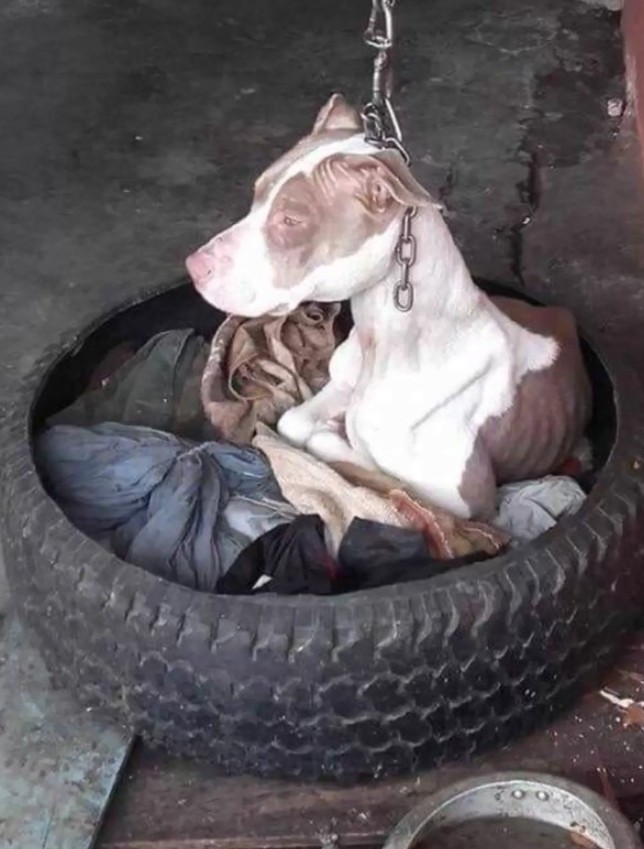In nearly every corner of the globe, guard dogs are a common sight. Their role is clear: to protect, to ward off intruders, and yes, to sometimes intimidate. That’s their job, after all. When we see a guard dog, a little fear is usually expected. But when people came across Cala, a guard dog stationed outside a car dealership in San Jose, Costa Rica, fear was the last thing they felt. Instead, what overwhelmed most was a deep sadness—followed closely by pity and anger.

Cala wasn’t the fierce and alert guardian one might expect. She was a heartbreaking sight, visibly suffering, frail from neglect. Her owner hardly fed her, and when illness struck, no effort was made to get her medical help. What should have been a proud, purposeful life as a guard dog turned into a prolonged nightmare. Over time, Cala grew so weak that she could no longer even stand. Her days were spent sitting inside an old car tire, her head hanging low, not out of submission or discipline, but because she literally couldn’t lift it.
She had a short chain around her neck—so tight it dug into her skin—and it kept her from lying down properly. Her head, painfully suspended, hung from the weight of the chain, and the constant pressure began to cut into her neck, slowly and cruelly. Her breathing grew labored, her eyes hollowed, and her body gave off the unmistakable signs of someone losing the battle for life. If no one had intervened, Cala was on a path to die in that miserable spot, overlooked and forgotten.
Thankfully, fate had other plans. A concerned neighbor, someone who noticed Cala’s deteriorating condition, decided to take action. They contacted the police, who then reached out to Territorio de Zaguates, a well-known local animal sanctuary. The shelter’s team, led by founder Lya Battle, didn’t hesitate—they knew they had to act. But they also knew this wouldn’t be easy.
The first time Lya Battle saw Cala, the image was seared into her memory. “I felt desperately sad and frustrated,” Battle shared in an interview with The Dodo. “The picture I first saw of her showed a pitiful creature robbed of its dignity and ready to give up—a dog whose spirit had been broken and was just waiting for the end to come while living a never-ending nightmare.”
It took a coordinated effort between the shelter and the police to remove Cala from her abusive environment. Once rescued, she was immediately taken to a veterinary clinic, where she received urgent treatment for the deep wounds caused by the chain embedded in her neck. She was severely undernourished, dehydrated, and emotionally traumatized. But for the first time in what must have felt like forever, she was finally being cared for.
After her stay at the clinic, Cala was brought to Territorio de Zaguates. It would be her new temporary home as she worked on healing—physically and emotionally. Her recovery was far from instant. The wounds on her neck were difficult to treat and prone to infection. Worse, the trauma of her past had left deep psychological scars. Shelter staff noticed Cala seemed to dislike the other dogs. They were hesitant to let her interact too closely with them, fearing that she might be aggressive or unmanageable.
Some volunteers even speculated that Cala had never seen another dog in her life—or worse, that she might have been trained to attack them. Despite their concerns, the shelter team remained patient and gentle. They gave Cala the space and time she needed, refusing to give up on her.
And gradually, something incredible happened. Cala began to trust. Slowly but surely, she started warming up to the other dogs. Her transformation was subtle at first—just a little more wag in her tail, a curious glance instead of a guarded growl. Then one day, she was no longer the timid, sickly soul they had rescued. She blossomed into a confident, affectionate dog who sought out human attention and began to display a bright, resilient personality.
“With every day that passed, we saw more of her personality come through,” Battle explained. “She went from fearing humans to trusting them, and even playfully bothering them for attention.”
But Cala’s journey wasn’t without more setbacks. In June of that same year, a cruel act rocked the shelter. Unknown individuals snuck into Territorio de Zaguates and laid poisoned sausages throughout the property. Sixteen dogs tragically lost their lives. Cala had eaten one of the poisoned sausages too, but miraculously survived. Her size may have saved her—perhaps she hadn’t ingested as much toxin as the others.
Still, she was left shaken by the incident. For a while, she experienced neurological issues and struggled to regain her footing, both literally and mentally. Yet again, Cala pulled through. Her tenacity was unshakable. After all she had endured—starvation, abuse, illness, and even attempted poisoning—she kept fighting. Her strength was undeniable.
Cala’s story is one of extraordinary survival. She was rescued when she was barely clinging to life. Her recovery, though long and painful, has inspired countless people. Not every dog gets a second chance, but Cala did. And she made the most of it.
Today, Cala lives with a loving foster family. She’s finally surrounded by warmth, care, and the affection she had been denied for so long. She wakes up to kindness, not fear, and ends her days with comfort, not pain.
As for Lya Battle, she continues to rescue and rehabilitate dogs, dedicating her life to saving those with nowhere else to turn. Yet even among the many lives she’s touched, Cala remains unforgettable. Her story is a powerful reminder of the difference that compassion, courage, and second chances can make.
From despair to hope, from neglect to love—Cala’s journey proves that even the darkest moments can give way to light.





